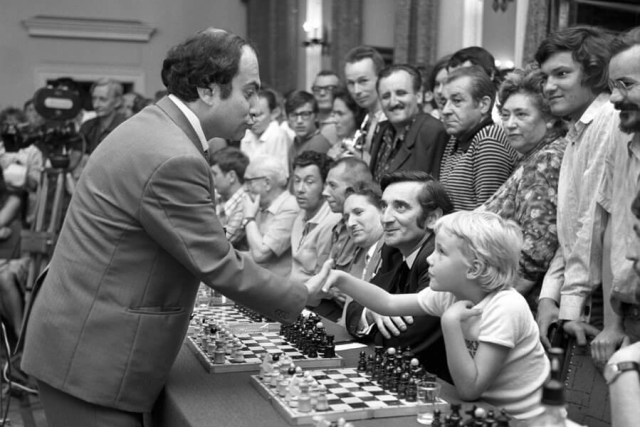In our series ‘World Champion Born On This Date,’ we will tell the story of Mikhail Tal, the Champion who reigned for the shortest term among all champions yet remains the favourite of millions of players.
Mikhail Tal was born in a Jewish family on 9th November 1936 at Riga in Latvia. As a child, Tal joined the Young Pioneers Chess Club, then held at The Riga Palace. His game improved rapidly after the great Master and Problem Composer Alexander Koblents started tutoring him in 1949.
1952-1960: Major Achievements of Mikhail Tal
- 1952– Finished ahead of his trainer in the Latvian Championship.
- 1953– Won his first Latvian title
- 1954– Became a Soviet Master in 1954.
- 1957– Became the youngest player to win the USSR Chess Championship.
- 1959– Won the Candidates’ Tournament held in Yugoslavia, with a score of 20 points from 28 games. He finished 1.5 points ahead of his nearest rival Paul Keres.
- 1960– Defeated Mikhail Botvinnik in a World Championship match, held in Moscow, with a score of 12½–8½.
Mikhail Tal- Lost the Sublime Touch
Immediately after winning the World Crown, Mikhail Tal developed a chronic kidney ailment. He lost the return World Championship match to Botvinnik in 1961 by a score of 8-13.
In the period between the two World Championship matches, Botvinnik thoroughly analysed Tal’s style and turned most of the games of the return match into slow wars of manoeuvre or endgames, rather than complicated tactical battles.
After losing the return match, Tal was never in contention for the World Crown. Almost two decades later, in 1980, Mikhail Tal played a secret training match against young Garry Kasparov, which turned out to be mutually extremely beneficial. It is indeed remarkable that Tal’s highest Elo rating (2705) was achieved in 1980, 19 years after losing the World Crown.
Learn from the Champion
A large section of Chess Masters considered Mikhail Tal as a ‘great master who strived for sharp and complicated play ’ while several others criticised him for ‘taking unnecessary risks’. He held the record of being the Youngest World Champion (till it was broken by Garry Kasparov) and a player who had the longest unbeaten streak of 95 games (till it was broken by Ding Liren).
Today I wish to show you a little-known game by Tal which I was lucky to see as a child in Fred Reinfeld’s “One Hundred Brilliancy Prize Games”. As per the commentary, the game was awarded the ‘Second Brilliancy Prize’. I was so thrilled by the game that I took a fancy for ‘King’s Indian Defence’, which never faded.
Janusz Szukszta – Mikhail Tal [E86]
World Students Team Blitz ch. 15.04.1956.
1.d4 Nf6 2.c4 g6 3.Nc3 Bg7 4.e4 d6 5.f3
The Saemisch variation against the King’s Indian Defence.
5…..0–0 6.Be3 e57.Nge2 c6 8.Qb3?! exd4 9.Nxd4
Mikhail Tal
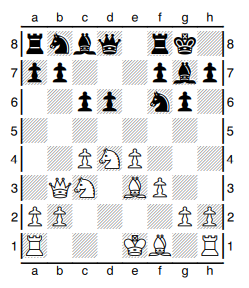
Janusz Szukszta
9…d5!
Tal — playing White — must have been taken aback when Vistinietzki had dropped this bomb against him a year before! The game had ended in a draw after a complex battle. A Chess player needs to form a habit of learning from the opponents at a very young age. Adolf Anderssen, the Magician of Chess from the 19th Century, was exceptionally good at using the opponent’s attacking ideas after brushing them up with accuracy and logic.
10.cxd5 cxd5 11.exd5
11.0–0–0 was the safer cautious option chosen by Tal (White) a year earlier.
11…Re8! 12.Kf2
Mikhail Tal
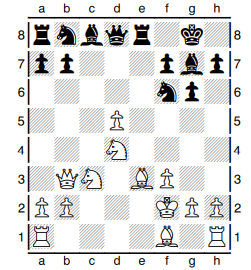
Janusz Szukszta
12…Nc6!! 13.dxc6
13.Nc2?was tried in Zaruba, A-Marsalek,J CSR-ch. 1954, when Black failed to find (13) 13…Na5! 14.Qa4 Bf5! 15.b4? Bxc2 16.Qxc2 Rc8 17.Bd2 Ng4+! 18.fxg4 Rxc3! 19.Bxc3 Qb6+ 20.Kg3 Re3+ 21.Kh4 g5+ with a rapid mate. For example, 22.Kxg5 Qh6+ 23.Kf5 Qg6+ 24.Kf4 Bh6+ 25.g5 Qxg5#
Mikhail Tal
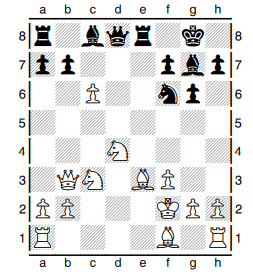
Janusz Szukszta
13…Rxe3!! 14.Rd1?
Mikhail Tal
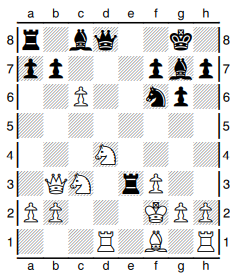
Janusz Szukszta
14.Kxe3! was the only option though Black has a huge advantage with 14…Bh6+!
[ But not 14…Ng4+ doesn’t look strong, as after 15.Ke2! Qxd4 16.Ne4Black seems to have run out of fuel.]
15.Kd3!
[15.f4 loses to 15….Bxf4+ 16.Kxf4 Qxd4+ 17.Kf3 Bg4+ 18.Kg3 Qe3+ 19.Kh4 g5#]
15…bxc6! 16.Kc2 Qxd4 17.Rd1 Qe5 18.Bd3 Be6 with a crushing attack!]
The move played 14.Rd1 allowed a rapid finish!
14…Ng4+! 15.fxg4 Bxd4
There is no escape from a deadly discovered check now!
16.Rxd4 Qxd4 17.Qd5
Mikhail Tal
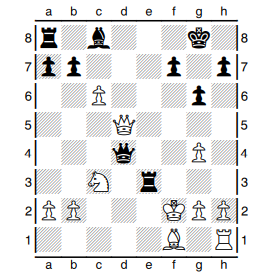
Janusz Szukszta
The game went
17…Re2+! 18.Kxe2
[18.Kg3? Qxg4#]
18…Bxg4+ 19.Ke1 Re8+ 20.Be2 Rxe2+! White resigned in view of 21.Nxe2 Qxd5 etc.]0–1

